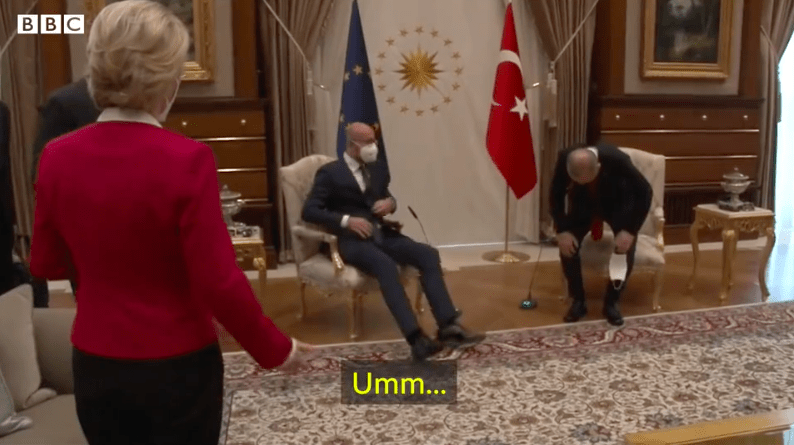Almost a month has passed since the now infamous ‘sofa-gate’ incident where, during a meeting with Turkish president Tayyip Erdogan, Ursula von der Leyen was not provided with a chair. Instead she was forced to sit on a nearby sofa. And yet it is this event – rather than Europe’s ongoing vaccine woes – that seems to be at the forefront of the president of the European Commission’s thoughts.
Von der Leyen used a speech given to the European Parliament to reiterate accusations of sexism over sofa-gate. The president did everything she could to drive home her feminist message, concluding that:
‘I am the president of the European commission. And this is how I expected to be treated when visiting Turkey two weeks ago, like, a commission president – but I was not.’
Do EU citizens really want to hear their president moaning about these sorts of political micro aggressions?
You only need to imagine a man saying those words to realise how grating they actually are. Strip away the guise of feminism and what’s left is a remark that smacks more of hubris than a genuine cry of discrimination.
What von der Leyen doesn’t seem to realise is that bringing up this diplomatic faux pas again a month after it occurred betrays just how vast the gulf is between her priorities as a world leader and those of ordinary Europeans. Or, indeed, women.
It’s hard for the sisterhood to feel much sympathy for an individual who has risen seamlessly to the top of her profession (and, as Katja Hoyer points out, has largely failed upwards) and whose case for discrimination amounts to having to sit on a rather palatial sofa as opposed to a chair.
What’s more, this diplomatic quibble is taking place against a backdrop of a global pandemic in which Europe is hardly faring well. Do EU citizens, stuck as they are in a cycle of endless lockdowns and vaccine delays, really want to hear their president moaning about these sorts of political micro aggressions?
This is a drama that is largely of the president’s own making. If she had kept her displeasure to herself during the Erdogan encounter, it’s unlikely any of the press present would have picked up on the sleight. But her visibly wounded pride gave the game away. To raise it again may earn her kudos in fashionable quarters – Vogue has already published a profile piece on her, complete with a glossy photo portrait. But it won’t increase her capital with ordinary Europeans, not that she needs to worry about anything as inconvenient as an electorate.
And perhaps that’s the takeaway point from this whole saga. Electorates keep politicians humble. As Boris Johnson is finding, even off-the-cuff remarks uttered in the heat of the moment in a private study demand public scrutiny when you are elected to office. Von der Leyen, on the other hand, can become as wrapped up in diplomatic tit-for-tats as she likes without ever being brought back down to earth by the perspective of the man (or woman) on the street.
But with Euroscepticism growing in almost every quarter of the EU – from Italy and Poland to France – von der Leyen does need to choose her words wisely if she wants to keep dissenting voices on side and, indeed, court potential members like Turkey. A good place to start would be to prioritise diplomatic relations over an insignificant personal sleight.
Von der Leyen may be used to being treated as a European heavyweight. But in the post-pandemic landscape, it might not be such a bad thing if she finds she has to work a little harder to justify the privileges and platform she has come to enjoy, even if it means taking a sofa seat.







Comments